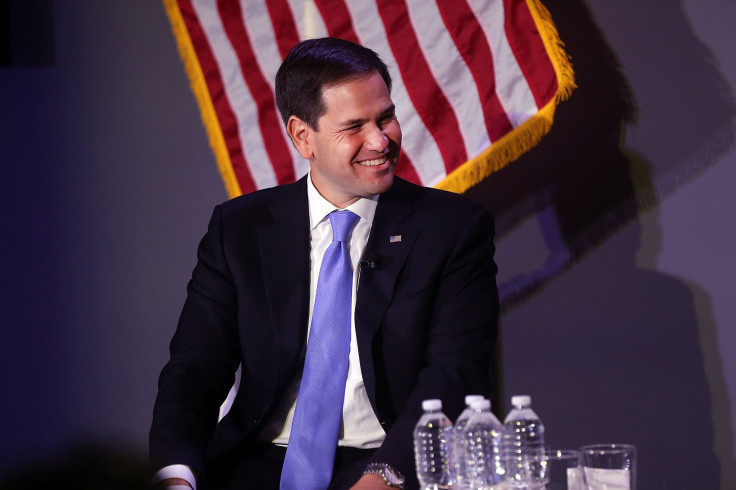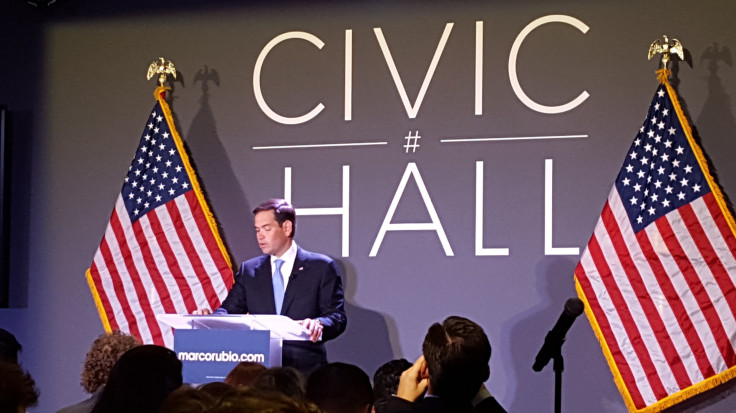Marco Rubio Hopes Sharing Economic Plan, Outreach To Young Tech Entrepreneurs Will Undercut Hillary Clinton

U.S. Sen. Marco Rubio walked briskly down an angular aisle Tuesday, passing rows of multicolored chairs that befit the predominantly young, entrepreneurial and tech-literate New York City crowd that had filled the room just moments before. As he launched into his campaign speech, attendees nodded respectfully and took notes on their smartphones about the presidential candidate's proposals for the so-called sharing economy many of them might one day hope to be leaders in.
The Florida senator’s Manhattan visit to Civic Hall, a self-described “one-of-a-kind community center for the world’s civic innovators,” was an opportunity for the Republican candidate to appeal to younger and technology-minded voters as the sharing economy concept takes the national spotlight for the first time in a presidential election. But his push to keep the sharing economy largely unregulated by the federal government is also an opportunity to draw a clear line between himself and Hillary Clinton, the current front-runner for the Democratic nomination.
"If there’s one thing that matters in the 21st century economy, it’s innovation. In order to be the leading economy on earth, America must be the most innovative economy on earth," Rubio said. He unveiled Tuesday his plan to keep the fast-growing industry that includes Uber, TaskRabbit and Airbnb mostly unregulated should he become president.
During the speech and in a question-and-answer session later, Rubio noted the benefits for consumers and workers that on-demand and sharing economies provide. They are more responsive to consumer needs and allow workers to set their own hours, he said.
"The on-demand economy is a miracle that only American free enterprise could produce," he said. "That’s why it’s so shameful that the biggest obstacle to the growth of this platform is our very own government."

His speech seemingly won over many of the tech entrepreneurs and workers in the room. Some said Rubio appeared to be one of the more levelheaded presidential candidates. They said they were heartened to hear how much the Republican candidate mentioned innovation and the need to foster spaces where emerging technology companies can be allowed to grow. Many, however, also emphasized their belief that regulations in the industry could be agreeable if they protect workers and consumers.
"We do want some regulations, but we don't want regulations that handcuff us and costs us a lot," said Cris Merlado, 34, the founder of GrantAnswers, an online college and career-readiness company in New York City.
Happening now: @marcorubio talking the sharing economy and tech in our event space. #nytech pic.twitter.com/xIFi5vGAY8
— Civic Hall (@CivicHall) October 6, 2015
The sharing economy, best known for companies like Uber and Airbnb, has grown exponentially in the last few years. Uber, which connects drivers to riders, has threatened traditional taxicab services and grown to be worth $51 billion in just over six years. Airbnb has threatened traditional accommodation services like hotel chains and was recently valued at over $25 billion. The industry as a whole is expected to grow to $335 billion globally by 2025. Both of those highly visible companies have been in legal fights over regulations in cities across the country for years.
Democrats and Republicans have approached the issue on the 2016 campaign trail in different ways. Republican presidential candidates like Rubio and Kentucky Sen. Rand Paul have generally celebrated the emerging industry and pushed for lax regulation; Clinton has been more skeptical.
“Many Americans are making extra money renting out a spare room, designing a website ... even driving their own car. This on-demand or so called 'gig' economy is creating exciting opportunities and unleashing innovation,” Clinton said in July. “But, it's also raising hard questions about workplace protections and what a good job will look like in the future.”
Great probing by @Rasiej of @marcorubio, who is very lucid on new econ, but workers/freelancers will be roadkill pic.twitter.com/vHsDCr5p41
— Jonathan Askin (@jaskin) October 6, 2015
Harsh critiques of the sharing economy can fall flat to tech leaders, said Jonathan Askin, 49, founder and director of the Brooklyn Law Incubator and Policy Clinic at Brooklyn Law School. He said Democrats are in danger of letting Republicans win the sharing economy debate and make them seem like an old-school party opposed to popular services. Askin, a key figure in President Barack Obama’s 2008 presidential campaign tech team, said it would be smart for Democrats to think more about ensuring that communities outside of wealthy areas in Manhattan and parts of Brooklyn have access to shared economy services. Overall, they need to simply accept a simple fact that Republicans like Rubio are tapping into, he said.
“I think Democrats need to recognize that the gig economy is here,” Askin said. “We can’t slow down. We’ve got to embrace it.”
© Copyright IBTimes 2024. All rights reserved.






















